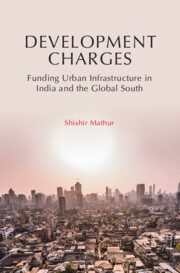Book contents
- Frontmatter
- Contents
- List of Figures
- List of Tables
- Foreword
- Preface
- List of Abbreviations
- 1 Introduction to Development Charges: Normative Bases and Their Role in Local Public Finance
- 2 Use of Development Charges Globally
- 3 Major Design and Implementation Considerations
- 4 Overview of Development Charges in India
- 5 Case Studies of Development Charge Programs
- 6 Recommendations
- 7 Way Forward and Future Research Opportunities
- References
- Index
7 - Way Forward and Future Research Opportunities
Published online by Cambridge University Press: 12 January 2024
- Frontmatter
- Contents
- List of Figures
- List of Tables
- Foreword
- Preface
- List of Abbreviations
- 1 Introduction to Development Charges: Normative Bases and Their Role in Local Public Finance
- 2 Use of Development Charges Globally
- 3 Major Design and Implementation Considerations
- 4 Overview of Development Charges in India
- 5 Case Studies of Development Charge Programs
- 6 Recommendations
- 7 Way Forward and Future Research Opportunities
- References
- Index
Summary
The last few years have seen an increased global focus on local government finance. This focus turned into a shared commitment at the UN-HABITAT III Conference held in Quito, Ecuador, where the New Urban Agenda (NUA) was adopted. NUA resulted from an extensive collaborative effort that included nearly 200 national and thousands of state, regional, and local governments; scores of UN agencies; and several thousand other organizations, policy experts, and networks. The agenda notes the significant urbanization occurring globally and recognizes the urgency of lifting millions of urban poor out of poverty and improving urban QOL in an environmentally sustainable way. NUA explicitly acknowledges municipal finance as one of the five main pillars for implementing the agenda and highlights the need to strengthen it to sustainably create, generate, and share the value gains due to urban development. Furthermore, NUA calls for developing transparent and accountable financing tools and stresses the need to link fiscal and urban planning systems and promote LVC tools (HABITAT III 2016). Development charges are a valuable tool to fulfill the NUA.
Development charges are widely used across the world. A recently published compendium of LVC tools surveyed 60 countries around the globe and found that development exactions (both cash/monetary and in-kind/non-monetary) are the most-used LVC tool among the five studied in the compendium (OECD and Lincoln Institute of Land Policy 2022). Moreover, 43 countries use development exactions; of them, approximately 85 percent (around 37 countries) use monetary development exactions, that is, development charges. The use of these charges is likely to continue to increase as countries worldwide adopt neoclassical public finance tools that adhere to the BTP principle.
However, development charges are used unevenly, even within a country, state, and region. Examples from Australia, South Africa, and the US show that some jurisdictions fund a large proportion of their fundingneeds through this tool, whereas others a mere fraction of them. Moreover, due to the multilayered opacity around the design and use of development charges, it is impossible to get an accurate and comprehensive picture of their use. The US arguably has the best data on these charges, but even that comes from national surveys that rely on readily available data rather than scientific survey techniques. The utility of this book should be considered in this larger context of sparse knowledge about this critical urban development finance tool.
- Type
- Chapter
- Information
- Development ChargesFunding Urban Infrastructure in India and the Global South, pp. 172 - 177Publisher: Cambridge University PressPrint publication year: 2024



